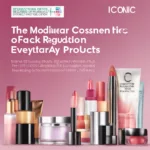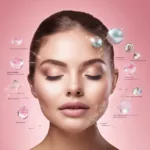3 December 2023
The newly passed Modernization of Cosmetics Regulation Act (MoCRA) aims to enhance the regulation of cosmetics and personal care products in the United States, but critics argue that it falls short of addressing key concerns.
The Food and Drug Administration (FDA), responsible for safeguarding public health in the US, has long had broad regulatory powers over various products. However, one area that has remained largely untouched by significant updates to regulations is cosmetics and personal care products. With the passage of the Modernization of Cosmetics Regulation Act in 2022, the FDA is set to gain more authority over beauty products. While the new law is a step in the right direction, some experts argue that it fails to adequately address concerns over product safety and transparency.
Outdated regulations and the need for change
For the past 85 years, the regulations surrounding cosmetics and personal care products have remained largely unchanged, with the FDA’s authority in this area defined by the Food, Drug, and Cosmetic Act of 1938. This outdated framework has prevented the FDA from taking important steps to protect consumers, such as mandating recalls of harmful products and requiring companies to disclose fragrance and flavor ingredients. The MoCRA, which goes into effect next month, aims to address these issues and modernize cosmetic regulations.
Criticisms of the Modernization of Cosmetics Regulation Act
Despite the positive changes brought about by MoCRA, critics argue that the new law falls short of what is needed to ensure the safety of beauty products. One major concern is the lack of requirements for cosmetics companies to prove the safety of their products before they are sold. Under the new law, unsafe products can only be recalled once they are already on store shelves. Additionally, the regulations regarding the use of chemical substances in cosmetics remain relatively lax compared to those in European nations, with the US having banned only 11 substances compared to the EU’s ban on over 2,400 chemicals.
The impact on consumer health and disparities
The potential health risks associated with exposure to harmful chemicals in cosmetics are a significant concern, particularly for marginalized communities. Research has shown that beauty products marketed in poorer neighborhoods and predominantly to people of color often contain higher levels of toxins. Black women, in particular, may be more vulnerable to the negative effects of these exposures. The lack of stringent regulations and transparency around cosmetic ingredients exacerbates these disparities and puts the health of millions of beauty product users at risk.
Industry influence and the need for transparency
The influence of the cosmetics industry on regulations is a point of contention for advocates seeking safer beauty products. The industry has consistently lobbied against stricter regulations, and loopholes in the MoCRA have been attributed to industry pressure. Critics also question the sponsorship of programs like Look Good, Feel Better, which provide cosmetic products to cancer patients. They argue that these programs may expose vulnerable individuals to potentially harmful chemicals.
Conclusion: While the Modernization of Cosmetics Regulation Act represents a step forward in enhancing the regulation of beauty products, there are still significant concerns regarding product safety and transparency. The need for greater transparency, independent testing, and a wider range of banned chemicals remains unaddressed. As advocates work to close these loopholes, it is clear that more needs to be done to protect consumers and ensure the safety of the products they use daily.



